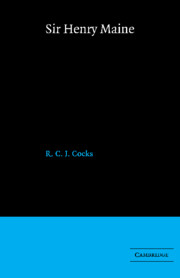6 - THE RECEPTION OF MAINE'S JURISPRUDENCE
Published online by Cambridge University Press: 29 September 2009
Summary
It is a commonplace in the history of jurisprudence that later generations fasten on a few aspects of a jurist's achievement and thereby distort the nature of his work. Recent scholarship has argued very forcibly that this has happened in the case of thinkers as contrasted as St Thomas Aquinas, Hugo Grotius, Gianbattista Vico, Sir William Blackstone, Adam Smith, Jeremy Bentham and John Austin. The later use of their ideas often appears to bear little relationship either to the specific intentions of the jurists concerned, or to the very broad themes in their works which come to the fore when the reader has in mind the historical context in which their books were produced.
If Maine's thought suffered a similar fate it should come as no surprise. We have seen that his own selection of Austin's ideas was unbalanced in the extreme; it is such a strange selection that it is difficult to believe that Maine was even attempting an objective assessment and he may have expected that he himself would fare no better at the hands of others. Also, because of their references to numerous topics, there was a quality to Maine's works which made them susceptible to inappropriate quotation; the critic can choose from such a variety of themes and topics. When he died in 1888 it was likely that the reception of Maine's ideas would be full of contrasts.
- Type
- Chapter
- Information
- Sir Henry MaineA Study in Victorian Jurisprudence, pp. 141 - 195Publisher: Cambridge University PressPrint publication year: 1988



